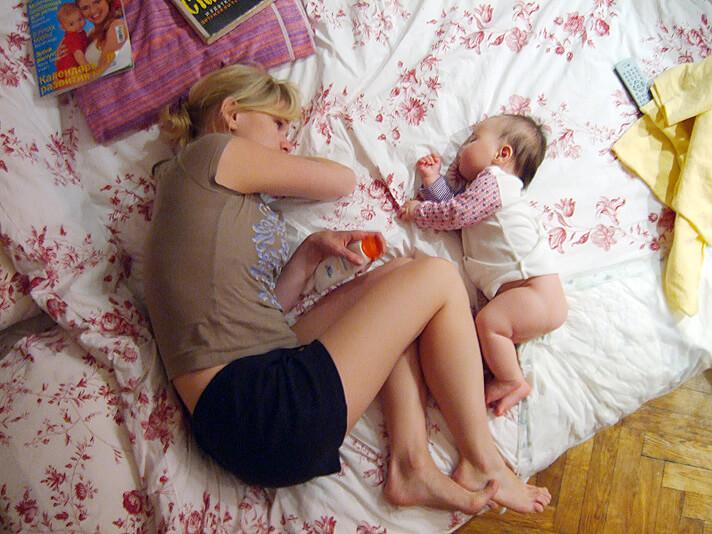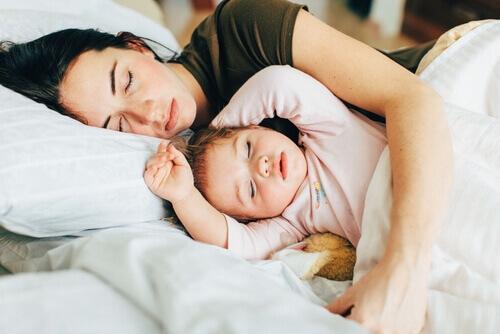What to Do If Your Child Doesn't Want to Sleep Alone

One of the problems that most parents face is creating good habits in their kids from an early age. This is especially true when it comes to going to bed in their own rooms, which can be difficult for some children. What can you do if your child doesn’t want to sleep alone?
Why does this problem happen?
You need to start thinking about your child’s sleep habits starting from the moment he’s born. Having your child take naps in his own room will be helpful. When he gets used to being in your arms and sleeping with mom and dad, he’ll start to form that habit at bedtime.
Insecurities and fears are bound to arise when kids get used to sleeping with their parents. These are two reasons why kids refuse to go to bed alone. Also, they look for thousands of excuses to stay in their parents’ room.
The truth is that it’s not the children’s fault. In fact, it’s a bad habit they acquired thanks to adults. Fortunately, you can correct it.
What should I do if my child doesn’t want to sleep alone?
Bedtime can be a real battle, and kids make up all sorts of reasons to avoid going to bed. For example, they’ll want to go to the bathroom, drink water, ask for 5 more minutes. They might even say they see shadows or have monsters living under the bed. How can parents handle all of this?
Parents can avoid these problems by trying a few different methods. One of them is to take their child to their room and not go back. Don’t go back in, even if he cries. Leaving him alone and calmly explaining that he’s safe and nothing bad will happen is a good start.
Another alternative is to see what’s wrong when it’s time for the child to go to bed. This way, you can find good solutions for each individual circumstance.

You might still wonder: “What am I doing wrong?” or “Why does my child not want to sleep alone?”
Here are some common mistakes that parents make when it comes to putting their kids to bed.
Not following a routine
Children should always go to bed at the same time. To do this, you can try using various activities, like reading a story or singing a song. It needs to be a time that kids enjoy and can be excited about. This way, they can happily sleep alone at bedtime.
Sleeping with your baby in your arms
Sometimes, you might be tempted to rock your children in your arms until they fall asleep. Although this makes them fall asleep faster, they don’t create their own sleep routine. Therefore, they might refuse to sleep alone in their beds or cribs.
“Insecurities and fears are bound to happen when kids get used to sleeping with their parents.”
Not being firm
It’s possible that your child throws a tantrum and doesn’t want to go to sleep. Then, you might make the mistake of letting him out of his room to watch TV. Even worse, maybe you sleep with him for a little bit until he falls asleep.
Kids take advantage of this weakness. Therefore, they’ll assume they won the battle and try to do it over and over again.
Scream and lose patience
When a child does anything but go to sleep, a big mistake is losing your patience and yelling. This isn’t the right way to treat your child, since he’ll get even more rebellious.
It’s best to go with him to his room, reassure him, and help him relax. You need to show authority and not let him do anything but sleep.

Not looking for the reason for the problem
It’s essential to understand your child. Sometimes, fears are responsible for keeping your child from being able to sleep alone. For example, he may feel afraid of the dark or think monsters live in his room.
Therefore, it’s important for parents to help their children be confident and calm. For example, if they’re afraid of the dark, give them a nightlight.
On the other hand, a stuffed animal is always a good friend to keep nearby at night. This will become your best ally when your child is afraid. It can even provide emotional support, especially before age 5.
As parents, you create the habits that your children will follow as they grow up. Discipline and patience are key to preventing bad habits from forming. Routines will help build responsible and independent children.
All cited sources were thoroughly reviewed by our team to ensure their quality, reliability, currency, and validity. The bibliography of this article was considered reliable and of academic or scientific accuracy.
- Landen, P., Ballesi, M., Uchitel, L., & Freire, M. (2008). Beneficios del masaje terapéutico en bebes prematuros dados de alta de la UCIN. Revista Iberoamericana de Psicomotricidad y Tecnicas Corporales
- Montserrat Galaa, A. M., & Fortes del Valleb, M. A. (2013). Aprender a dormir. Pediatría de Atención Primaria. https://doi.org/10.4321/S1139-76322013000500004
- Landa Rivera, L., Díaz-Gómez, M., Gómez Papi, A., Paricio Talayero, J. M., Pallás Alonso, C., Hernández Aguilar, M. T., … & Lasarte Velillas, J. J. (2012). El colecho favorece la práctica de la lactancia materna y no aumenta el riesgo de muerte súbita del lactante: Dormir con los padres. Pediatría Atención Primaria, 14(53), 53-60. http://scielo.isciii.es/pdf/pap/v14n53/revision1.pdf
- Horsley T, Clifford T, Barrowman N, Bennett S, Yasdi F, Sampson M, et al. (2007). Benefits and harms associated with the practice of bed sharing. Arch Pediatr Ado- lesc Med. 2007;161:237-45.
- Martin Martin, R., Sanchez Bayle, M., & Teruel de Francisco, M. C. (2017). El colecho en nuestro medio: estudio de casos y controles en las consultas pediátricas de Atención Primaria. Pediatría Atención Primaria, 19(73), 15-21. http://scielo.isciii.es/scielo.php?script=sci_arttext&pid=S1139-76322017000100003
- Rodríguez Villar, V., Moreno, M., & Navío, C. PRACTICANDO EL COLECHO. ASESORAMIENTO DE LA MATRONA. http://www.trances.es/papers/TCS%2005_3_6.pdf
- Ball, H. L., Hooker, E., & Kelly, P. J. (2000). Parent–infant co‐sleeping: fathers’ roles and perspectives. Infant and Child Development: An International Journal of Research and Practice, 9(2), 67-74. https://onlinelibrary.wiley.com/doi/abs/10.1002/1522-7219(200006)9:2%3C67::AID-ICD209%3E3.0.CO;2-7
This text is provided for informational purposes only and does not replace consultation with a professional. If in doubt, consult your specialist.








